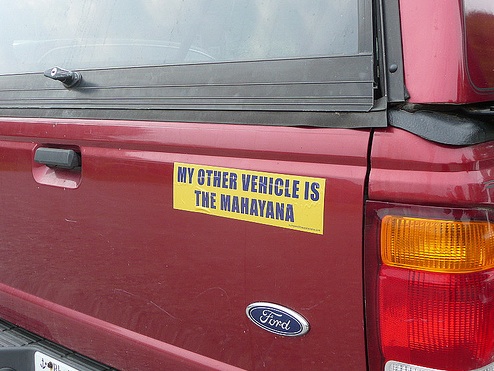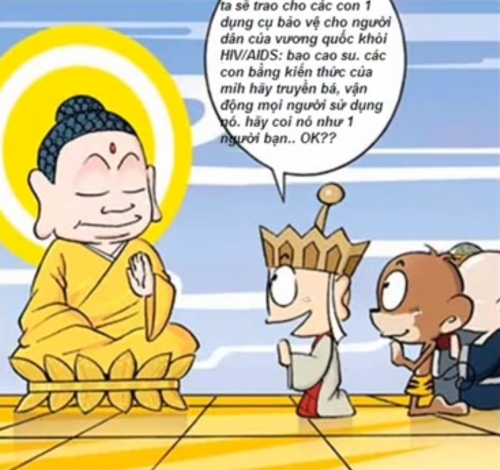
Found this funny Buddhist bumper sticker on chron.com, amid many Christian ones. As the post says, there’s something about expressing your religion publicly, for all to see; it’s a clear identity statement. But the thing is, I’d hazard a guess that unless you’re Buddhist yourself or know something about Buddhism, this bumper sticker wouldn’t mean a thing to you—not a lot of non-Buddhists know the word “mahayana.” So…what does that make this? A non-identity statement? (A Buddhist bumper sticker, then, indeed!) In any case, unidentified Ford owner, I like your sticker.
Onwards to our more serious Buddha Buzz news, like this clip that is outraging Buddhists in Vietnam. (I should warn you that unless you understand Vietnamese, the clip won’t mean much to you.) It’s supposed to be a recreation of the iconic Chinese novel Journey to the West, in which the Buddhist monk Xuanzang travels to India to receive teachings from the Buddha. The clip, called “Xuanzang Journeys to the West…for condoms,” shows Xuanzang and his companions pilgrimaging to the west to receive condoms, instead of teachings, from the Buddha and thus saving Vietnam from AIDS.


Two stills from the clip
Vietnamese Buddhists do not seem very happy about this, as we can see in this article from Tuoitre News. Unlike the “Rude Buddha” skit of last week’s Buddha Buzz, this little video, though comical in some ways, was well-intentioned. Its creators were trying to have a positive effect on society. Why the strong reaction, I wonder? It’s an interesting foil to sexually-progressive news from Nepal this week that they are launching a “gay Olympics,” the Vancouver Sun reports. It will be Asia’s “first ever multi-sport games for the lesbian, gay, bisexual and transgender community,” and will launch in September.
Last but not least, I enjoyed an article this week from the New York Times, “Post-Traumatic Stress’s Surprisingly Positive Flip Side,” which discusses “post-traumatic growth”: the idea that soldiers (and others, more generally), are reporting positive change in their lives from experiencing severe trauma. Research into this phenomenon “reported positive change in five areas: they had a renewed appreciation for life; they found new possibilities for themselves; they felt more personal strength; their relationships improved; and they felt spiritually more satisfied.” The wisest spiritual leaders among us have always taught that knowing how to respond to even the worst of situations is a key to living a happy life. I’m interested to see what science has to contribute, if anything, to the discussion.
Thank you for subscribing to Tricycle! As a nonprofit, we depend on readers like you to keep Buddhist teachings and practices widely available.